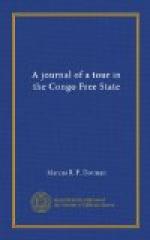[Illustration: THE FARM AT EALA.]
In spite however, of clever doctors, the men do not live to be much over forty years of age. Perhaps they have too many wives for there are far more old women than men. On the other hand, as there must be two or three women to each man, it is only natural to find more of the former at any given age. The infants are not weaned for three or four years and during that period the woman it is said refuses to lie with her husband. Another wife therefore, cohabits with the man while the first rears her child. Polygamy is thus a custom which the missionaries find very difficult to change. The State however, refuses to recognise more than one wife and many of the soldiers are legitimately married by the officials qualified to perform that office.
Much palm wine is consumed by the natives for its manufacture is very simple. A gourd is tied to an upper branch of a palm which is then tapped and the sap drops into the vessel. If this is left all night, fermentation takes place without artificial aid, and at midday a kind of highly scented alcoholic cider is produced which however, is acid and undrinkable by the evening. This natural wine must therefore, be drunk on the day of fermentation and does not improve on keeping.
What a useful tree the palm is! Its trunk, branches and leaves are fine building materials; its matting forms beds and furniture; its oil gives light, acts as butter or lard for cooking, makes soap when mixed with banana juice or an alkali, and indeed, can be used for all the purposes of oil; it forms wine, and the heart of the plant is most excellent eating as a salad. Therefore given meat, the palm tree and the banana, and a town can be built and its inhabitants fed. Both sexes smoke a great deal of tobacco and also Indian hemp, which latter has however, been found so injurious that it is illegal to grow the plant but the native tobacco is not at all unpleasant when smoked in a pipe.
On August 22nd we take a trip up a small river to the East of Ikoko which winds through dense forest and is evidently full of fish, for at intervals, barricades are erected which stretch right across the river, with the exception of a small space to allow canoes to go up and down. In the middle or one side however, an opening is left which can be closed by lowering one of the bamboo nets heavily weighted, vertically down. Platforms are erected ten or twelve feet high to raise or lower these nets and the whole structure is ingeniously and strongly put together. The fish are thus allowed to swim up and are then enclosed in a section of the river, when they are easily caught in baskets. All the riverside population engages in fishing. On the way I shot a toucan, which must have weighed ten or twelve pounds, with number five shot which happened to be in the gun at the time. The bird however, was hit in the head and breast. The natives at once plucked it and having scarcely warmed it at the fire greedily eat it.




